บทความนี้สร้างขึ้นโดยใช้ซอฟต์แวร์แปลภาษา
ฟิลด์ที่กำหนดเอง
Pipedrive เสนอ แนวทางที่ปรับแต่งได้สูง ในการจัดการกระบวนการขายของคุณ. Pipedrive มีแนวทางที่ปรับแต่งได้สูงสำหรับการจัดการกระบวนการขายของคุณ ขณะที่ข้อตกลง ลูกค้าเป้าหมาย รายชื่อติดต่อ โครงการ และผลิตภัณฑ์ของคุณมีฟิลด์เริ่มต้นที่จำเป็นสำหรับการจัดการข้อมูลแล้ว คุณยังสามารถสร้าง ฟิลด์ที่กำหนดเอง เพื่อเก็บข้อมูลที่เกี่ยวข้องกับบริษัทของคุณได้ด้วย
ฟิลด์ที่กำหนดเอง ช่วยให้การจัดระเบียบ การกรอง และการจัดการข้อมูลของคุณเป็นเรื่องที่ง่ายขึ้นโดยอิงจากข้อมูลที่สำคัญที่สุดสำหรับธุรกิจของคุณ

การเพิ่มฟิลด์ที่กำหนดเอง
เปิด เมนูบัญชี ที่มุมบนขวา ไปที่ การตั้งค่าบุคคล > ฟิลด์ข้อมูล แล้วเลือกเอนทิตี (ลีด/ดีล, บุคคล, องค์กร, สินค้า หรือ โครงการ) ที่คุณต้องการสร้างฟิลด์ใหม่ หลังจากเลือกเอนทิตีแล้ว คลิก “+ ฟิลด์ที่กำหนดเอง”. หลังจากเลือกเอนทิตี ให้คลิก "+ ฟิลด์กำหนดเอง".
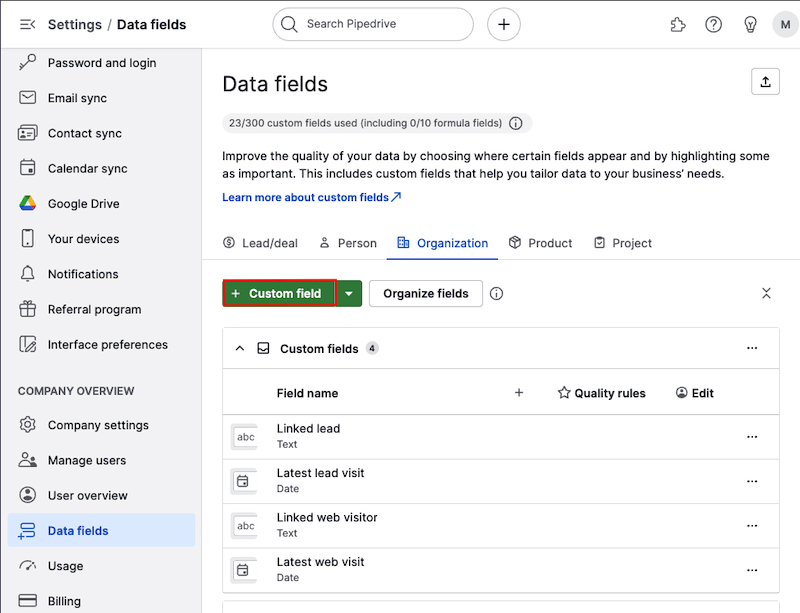
คุณสมบัติของฟิลด์
เมื่อคลิกแล้ว คุณจะเห็นหน้าต่าง เพิ่มฟิลด์ ซึ่งคุณสามารถระบุรายละเอียดต่อไปนี้ ขึ้นอยู่กับ แผน Pipedrive ของคุณ:
ชื่อ |
การดำเนินการ |
แผนขั้นต่ำที่ต้องการ |
ชื่อฟิลด์ |
จำเป็นสำหรับการสร้างฟิลด์ |
Lite |
ช่วยจัดระเบียบฟิลด์ที่กำหนดเองของคุณในมุมมองรายละเอียดต่าง ๆ |
Lite |
|
คุณสามารถแจ้งทีมว่าทำไมและวิธีการกรอกฟิลด์ (ใช้ได้เฉพาะกับฟิลด์ของลีดและดีลเท่านั้น) พวกเขาจะเห็นคำอธิบายเมื่อคลิกไอคอนข้อมูลถัดจากฟิลด์ คุณสามารถแจ้งให้ทีมของคุณทราบว่าทำไมและอย่างไรจึงต้องกรอกฟิลด์ (มีเฉพาะสำหรับฟิลด์ลีดและดีล) พวกเขาจะเห็นคำอธิบายหลังจากคลิกที่ไอคอนข้อมูลข้างฟิลด์. |
Growth |
|
จำเป็นสำหรับการระบุว่าข้อมูลชนิดใดที่จะเก็บในฟิลด์ที่กำหนดเอง | Lite | |
คุณสามารถเปลี่ยนประเภทฟิลด์ตัวเลขและสกุลเงินของดีลให้เป็นฟิลด์สูตรที่คำนวณโดยอัตโนมัติ |
Premium |
|
การกำหนดผู้ใช้ |
ด้วย ฟิลด์แบบอ่านอย่างเดียว คุณสามารถกำหนดได้ว่าผู้ใช้คนใดสามารถดูและแก้ไขฟิลด์ได้ | Premium |
ตำแหน่งที่แสดง |
ช่วยให้คุณระบุว่าในมุมมอง การเพิ่ม และมุมมอง รายละเอียด ของรายการใดบ้างที่จะพบฟิลด์ที่กำหนดเอง | Lite |
ช่วยให้คุณเลือกท่อการขายที่ฟิลด์ควรแสดงหรือซ่อนไว้ | Premium |
|
กฎคุณภาพ |
แนะนำทีมของคุณให้กรอกฟิลด์ที่ ต้องการ หรือ สำคัญ การทำเครื่องหมายฟิลด์เป็นฟิลด์ที่ต้องการจะบล็อกการบันทึกดีลจนกว่าจะกรอกข้อมูลสำคัญครบ การใช้ฟิลด์สำคัญจะเน้นข้อมูลที่ขาดหายในมุมมองรายละเอียดดีลโดยไม่ป้องกันการบันทึก การทำเครื่องหมายฟิลด์เป็นจำเป็นจะป้องกันไม่ให้บันทึกดีลจนกว่าจะกรอกข้อมูลสำคัญครบถ้วน. การใช้ฟิลด์ที่สำคัญจะแสดงข้อมูลที่ขาดหายในมุมมองรายละเอียดของดีล โดยไม่ขัดขวางการบันทึก. |
Growth (ฟิลด์สำคัญ)
Premium (ฟิลด์ที่ต้องกรอก) |
เพื่อผลลัพธ์ที่ดีที่สุด เราแนะนำให้กรอกข้อมูลรายละเอียดของฟิลด์กำหนดเองทั้งหมด. เพื่อผลลัพธ์ที่ดีที่สุด เราแนะนำให้กรอกรายละเอียดของฟิลด์ที่กำหนดเองทั้งหมด เพื่อสร้างฟิลด์ให้สำเร็จ คุณต้องอย่างน้อย ตั้งชื่อ และเลือก ประเภท ของฟิลด์
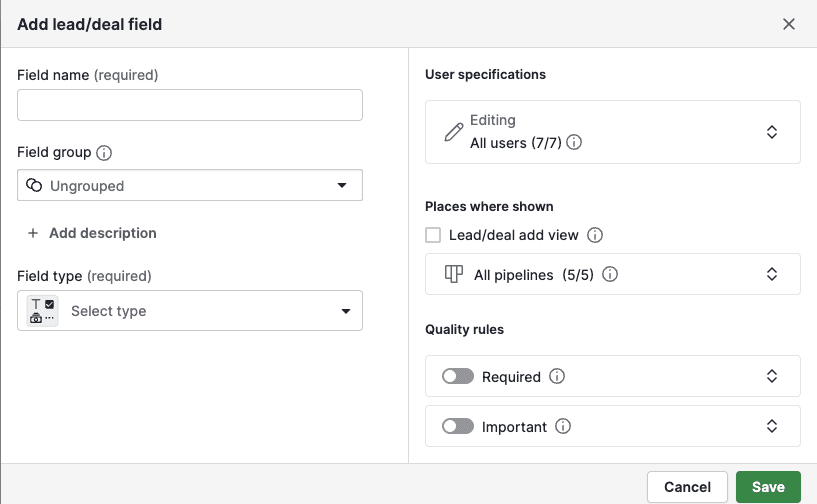
ฉันสามารถเพิ่มฟิลด์ที่กำหนดเองได้ที่ไหนอีกบ้าง?
หากคุณกำลังทำงานในพื้นที่ใด ๆ ด้านล่างนี้และสังเกตเห็นว่ามีฟิลด์หายไป คุณสามารถเพิ่มฟิลด์นั้นได้โดยตรงโดยไม่ต้องออกจากหน้าปัจจุบัน
ใน มุมมองรายการ ให้คลิกที่ไอคอนรูปเฟืองแล้วเลือก “+ ฟิลด์ที่กำหนดเอง”.

ใน มุมมองรายละเอียด ให้คลิกปุ่ม “...” ใกล้ส่วน รายละเอียด เลือก “ปรับแต่งฟิลด์” แล้วคลิก “+ ฟิลด์ที่กำหนดเอง” เพื่อสร้างฟิลด์ใหม่
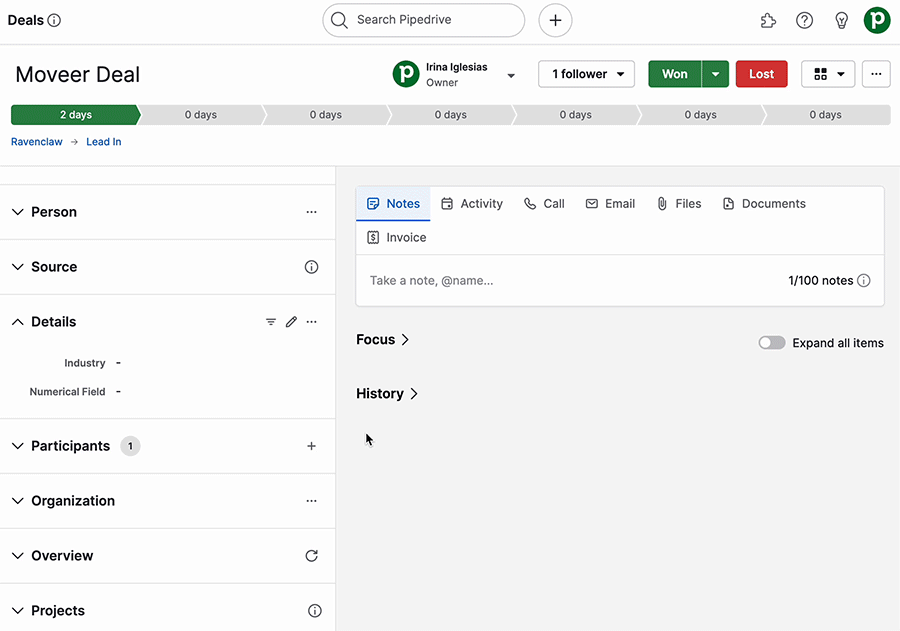
ในหน้าการ นำเข้า คุณจะเห็นตัวเลือกในการเพิ่มฟิลด์ที่กำหนดเองระหว่างขั้นตอนการจับคู่ อ่านข้อมูลเพิ่มเติมเกี่ยวกับการนำเข้าได้ใน บทความนี้. อ่านข้อมูลเพิ่มเติมเกี่ยวกับการนำเข้าได้ใน บทความนี้.

การดูฟิลด์ที่กำหนดเองของคุณ
คุณสามารถเพิ่ม ดู หรือ ลบ ค่าฟิลด์ที่กำหนดเอง ในตำแหน่งต่อไปนี้ภายใน Pipedrive:
มุมมองรายละเอียด
ใน มุมมองรายละเอียด ฟิลด์ที่กำหนดเองจะปรากฏในเอนทิตี รายละเอียด ทางด้านซ้าย
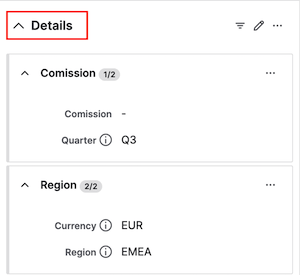
มุมมองรายการ
คลิกที่ไอคอนเกียร์ทางด้านขวาของตารางและเลือกฟิลด์ที่กำหนดเองในส่วน “เลือกคอลัมน์” คลิก “บันทึก” เพื่อทำให้คอลัมน์ฟิลด์ที่กำหนดเองนั้นปรากฏในมุมมองรายการ. คลิกไอคอนรูปเฟืองทางขวาของตาราง แล้วเลือกฟิลด์ที่กำหนดเองในส่วน “เลือกคอลัมน์” คลิก “บันทึก” เพื่อให้คอลัมน์ฟิลด์ที่กำหนดเองนั้นปรากฏในมุมมองรายการ
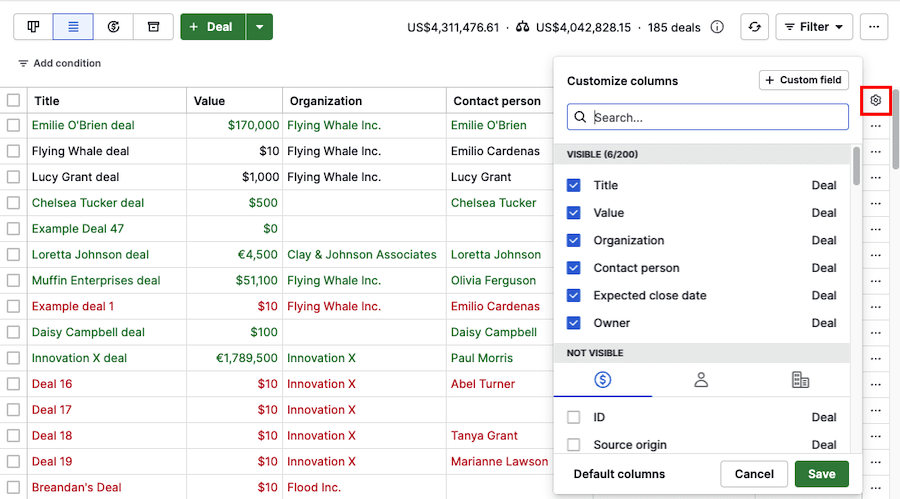
มุมมองการเพิ่ม
คุณสามารถเลือกให้แสดงฟิลด์ที่กำหนดเองใน มุมมองการเพิ่ม.
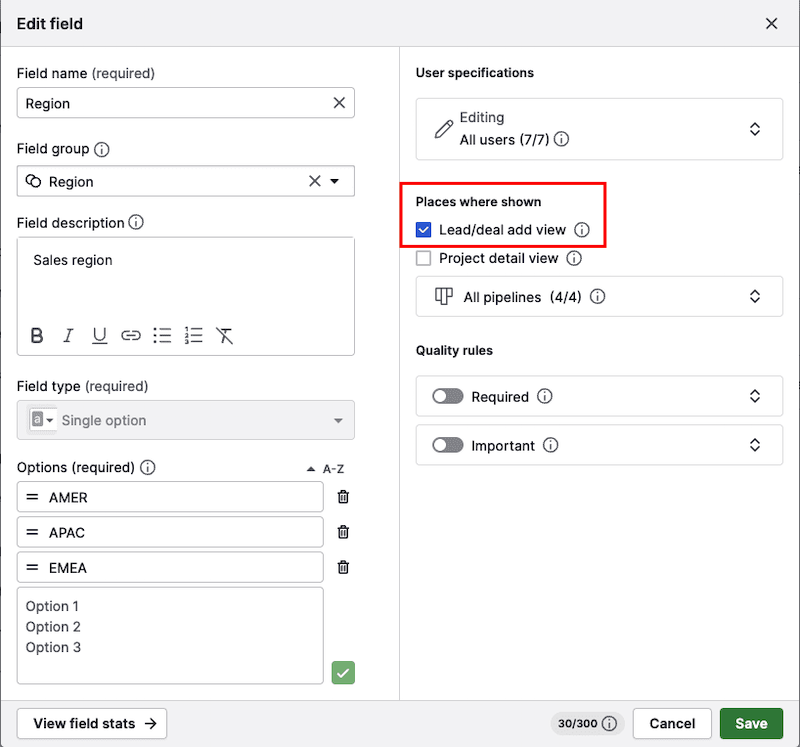
เมื่อเปิดตัวเลือกนี้ ฟิลด์จะมองเห็นได้เมื่อเพิ่มรายการใหม่ เช่น ดีลหรือลีด ในมุมมองการเพิ่มที่เกี่ยวข้อง
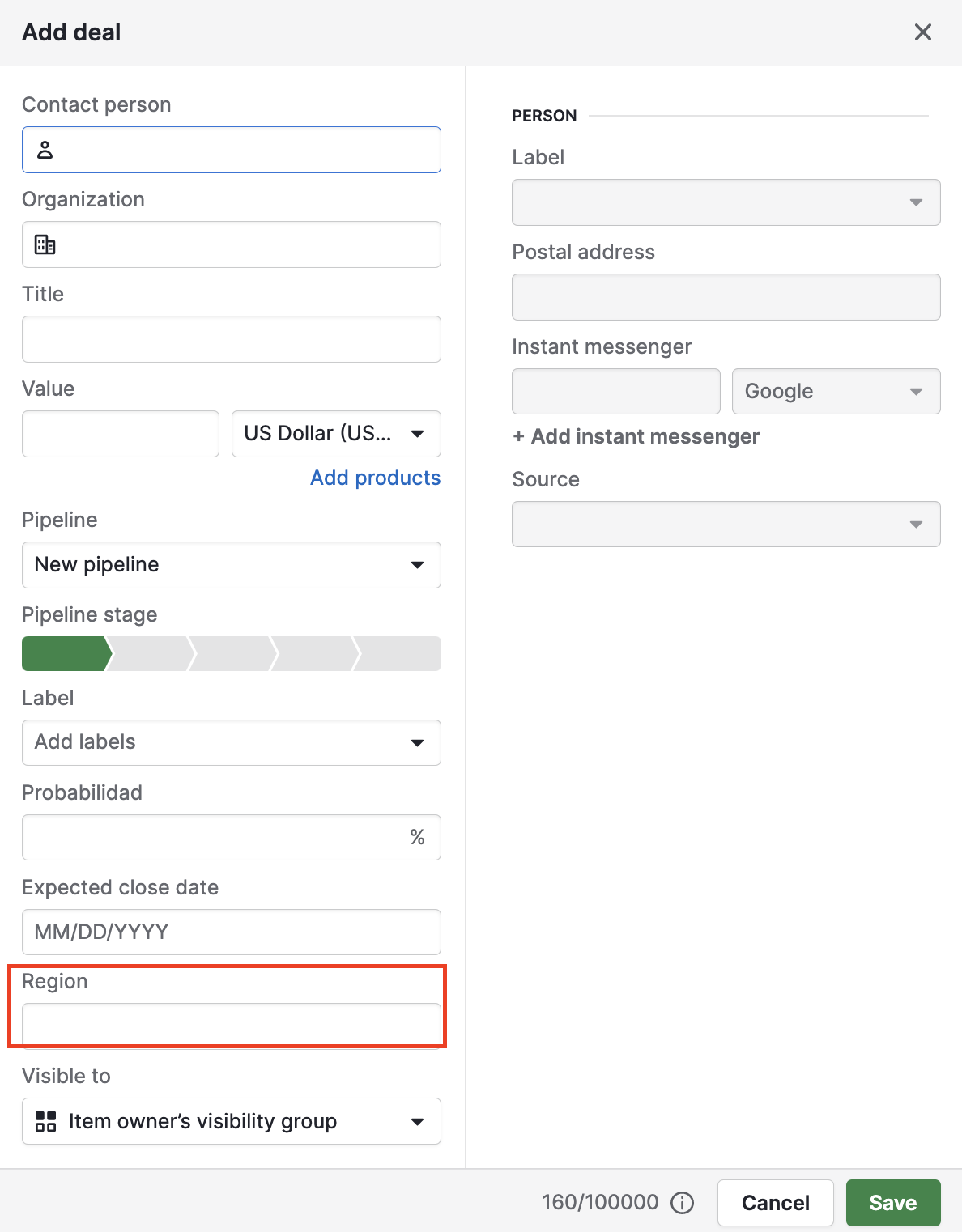
การนำเข้า
คุณสามารถดูและค้นหาฟิลด์ที่กำหนดเองได้ในขั้นตอนการจับคู่ฟิลด์เมื่อคุณนำเข้าสเปรดชีตเข้าไปยัง Pipedrive
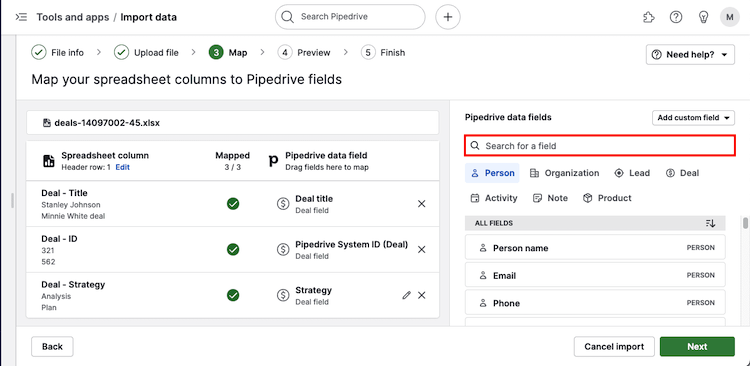
ฉันสามารถใช้ฟิลด์ที่กำหนดเองที่อื่นได้อีกที่ไหนบ้าง?
คุณสามารถใช้ฟิลด์ที่กำหนดเองเพื่อเรียกใช้งานใน การทำงานอัตโนมัติ เมื่อใดก็ตามที่ค่าของฟิลด์เหล่านั้นมีการอัปเดต เพื่อช่วยให้คุณเก็บข้อมูลเฉพาะจากลูกค้าได้ คุณสามารถใช้ฟิลด์ที่กำหนดเองเมื่อกำหนดค่า Web Forms ของ LeadBooster เพื่อช่วยให้คุณเก็บข้อมูลเฉพาะจากลูกค้า คุณสามารถใช้ฟิลด์กำหนดเองเมื่อตั้งค่าเว็บฟอร์มของ LeadBooster (Web Forms).
นอกจากนี้ ฟิลด์ที่กำหนดเองยังรองรับใน แม่แบบอีเมล และ Smart Docs ทำให้คุณสามารถดึงข้อมูลที่เกี่ยวข้องมาใส่อีเมลหรือเอกสารโดยอัตโนมัติ
เมื่อฟิลด์ของคุณมีข้อมูลแล้ว คุณยังสามารถใช้ฟิลด์เหล่านั้นเพื่อสร้างรายงาน Insights ที่กำหนดเอง เพื่อการนำเสนอข้อมูลที่มีความหมาย
การอัปเดตฟิลด์ที่กำหนดเองของคุณ
หากต้องการเปลี่ยนฟิลด์ที่กำหนดเอง ให้เปิด เมนูบัญชี แล้วไปที่ การตั้งค่าบุคคล > ฟิลด์ข้อมูล จากนั้นคลิกปุ่ม “...” ที่อยู่ถัดจากฟิลด์ที่กำหนดเองของคุณ.

คุณจะเห็นตัวเลือกดังต่อไปนี้:
แก้ไข
คุณสามารถเปลี่ยน ชื่อ, กลุ่ม, คำอธิบาย, การระบุผู้ใช้, ตำแหน่งที่จะแสดง และ กฎคุณภาพ ของฟิลด์ที่กำหนดเองได้ทุกเมื่อ แต่ ประเภท ของฟิลด์ที่กำหนดเองไม่สามารถเปลี่ยนได้หลังจากที่ได้สร้างแล้ว. ประเภทของฟิลด์กำหนดเองไม่สามารถเปลี่ยนแปลงได้หลังจากสร้างแล้ว.
จัดลำดับใหม่
คุณสามารถเปลี่ยนลำดับการแสดงของฟิลด์ที่กำหนดเองได้.
หลังจากคลิก “เรียงลำดับใหม่” จะมีหน้าต่างปรากฏขึ้นให้คุณเปลี่ยนลำดับฟิลด์ เมื่อคุณคลิก “บันทึก,” การเปลี่ยนแปลงจะถูกนำไปใช้กับมุมมอง เพิ่ม และ รายละเอียด. เมื่อคุณคลิก "บันทึก" การเปลี่ยนแปลงจะถูกนำไปใช้กับมุมมอง การเพิ่ม และมุมมอง รายละเอียด.
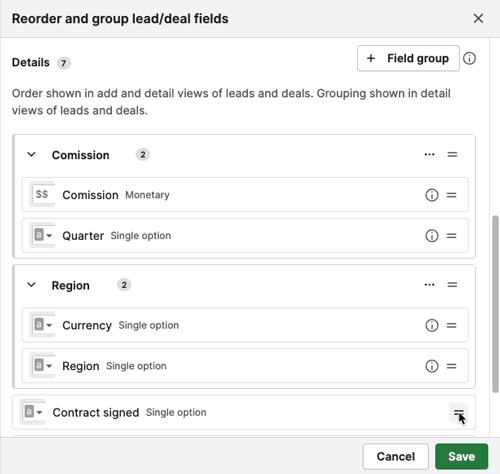
ลบ
การลบฟิลด์ที่กำหนดเองจะเป็นการลบฟิลด์และข้อมูลที่มีอยู่ของฟิลด์นั้นออกจากบัญชี Pipedrive ของคุณ.
คัดลอกคีย์ API
คุณสามารถคัดลอกคีย์ API ของฟิลด์ที่กำหนดเองของคุณ สำหรับข้อมูลเพิ่มเติมเกี่ยวกับวิธีการใช้ API คุณสามารถดูที่ เอกสาร API. คุณสามารถคัดลอกคีย์ API ของฟิลด์ที่กำหนดเองได้ สำหรับข้อมูลเพิ่มเติมเกี่ยวกับวิธีการใช้ API คุณสามารถดูที่ เอกสาร API.
การจัดกลุ่มฟิลด์ที่กำหนดเอง
คุณสามารถจัดฟิลด์ที่กำหนดเองเป็นกลุ่ม เพื่อช่วยให้ค้นหาฟิลด์ที่ต้องการได้ง่ายขึ้น
ขณะสร้างหรือแก้ไขฟิลด์ที่กำหนดเอง คุณสามารถคลิกที่ส่วน กลุ่มฟิลด์ และเลือก “+ กลุ่มฟิลด์” เพื่อเพิ่มกลุ่มใหม่
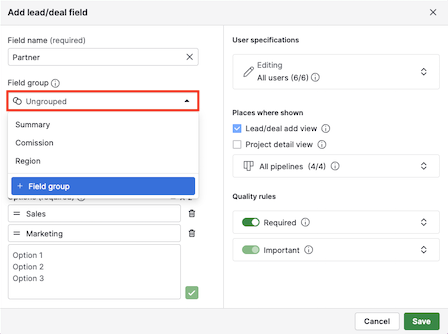
หลังจากที่คุณสร้างกลุ่มแล้ว คุณจะเห็นกลุ่มนั้นได้ที่ ฟิลด์ข้อมูล
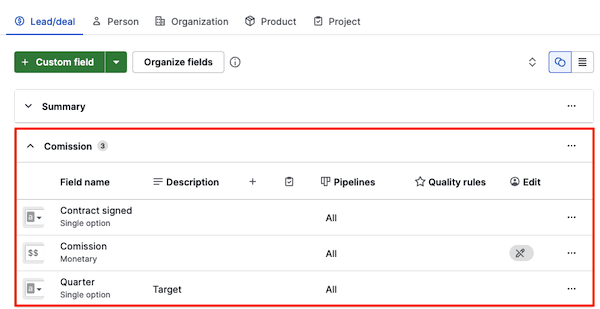
คุณสามารถดูฟิลด์เป็นแบบกลุ่ม หรือในมุมมองรายการมาตรฐาน
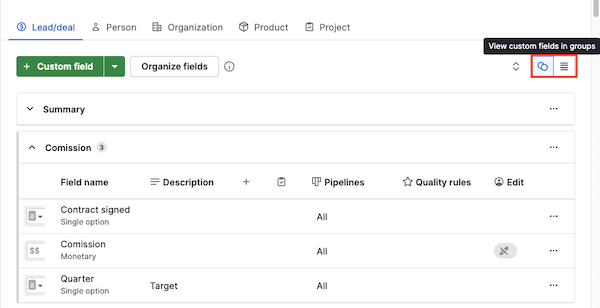
สถิติฟิลด์ที่กำหนดเอง
ผู้ดูแลระบบ อาจไม่ทราบเสมอไปว่าฟิลด์ถูกใช้งานที่ใด หรือข้อมูลใดอาจสูญหายหากพวกเขาลบฟิลด์เหล่านั้น
เพื่อวัดความสำเร็จและความมีประโยชน์ของฟิลด์ของคุณ และเพื่อหลีกเลี่ยงการลบโดยไม่ตั้งใจขณะทำการแก้ไข ผู้ใช้สามารถดูวันที่สร้างและวันที่อัปเดตของฟิลด์ รวมถึงสถิติที่แสดงว่าฟิลด์ถูกกรอกที่ใดหรือถูกใช้ในตัวกรองใดบ้าง
ในการดูสถิติของฟิลด์ ผู้ใช้ผู้ดูแลระบบต้องคลิกที่ฟิลด์เพื่อเปิดมุมมองแก้ไข จากนั้นที่มุมล่างซ้าย ให้คลิก “ดูสถิติฟิลด์” จากนั้น ที่มุมล่างซ้าย ให้คลิก "ดูสถิติฟิลด์".
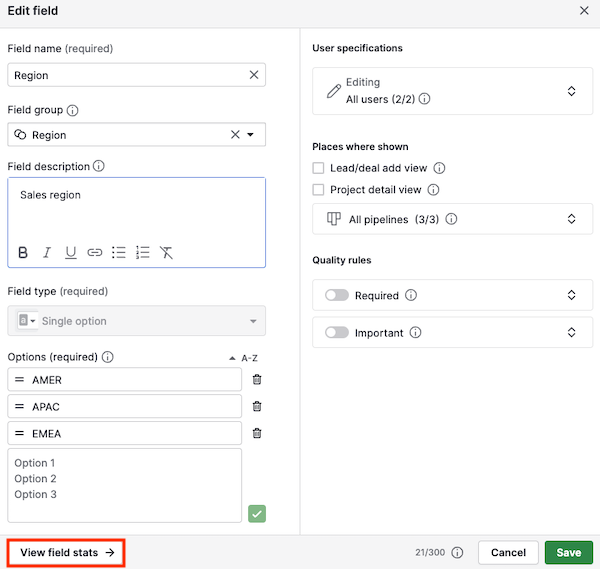
จากนั้นจะมีการแสดงกล่องโต้ตอบที่แสดงสถิติของฟิลด์. จากนั้นจะมีหน้าต่างแสดงสถิติของฟิลด์ ปรับใช้ข้อมูลนี้แล้วคุณสามารถกลับไป แก้ไข ฟิลด์หรือ ลบ ฟิลด์ได้
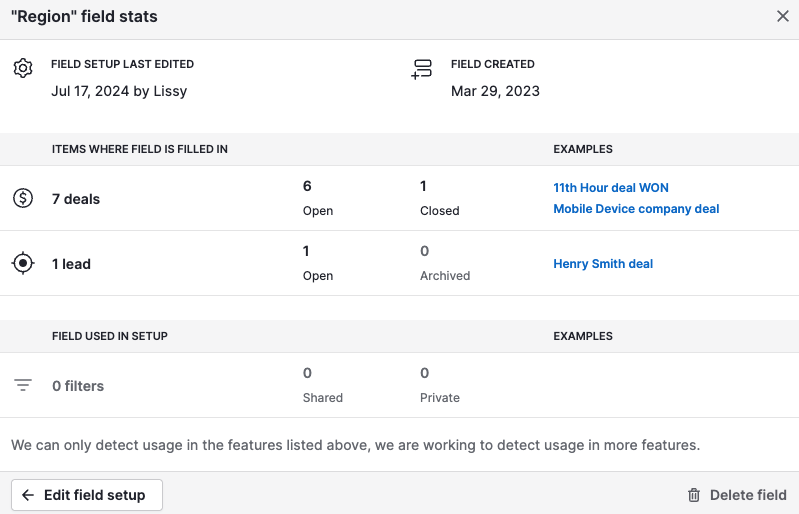
บทความนี้เป็นประโยชน์หรือไม่
ใช่
ไม่